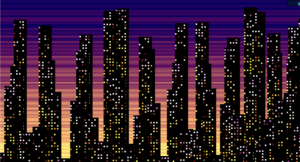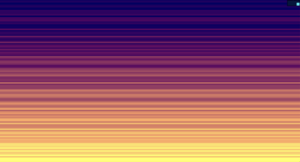Reverse Engineering Code Art - Part 4 - City Sunset
City Sunset v2 by KilledByAPixel
You can read his blog on this dwitter on his site. I wanted to reverse engineer it myself before reading his blog, so here goes.
The code is quite simple compared to the previous ones I’ve posted, which is why why I really like this dwitter so much
for(z=k=2e3;k--;x.fillRect(i*9+S(z*t)*z|0,j*9+t*420,t?9:z,9))i=k%9,j=k/9|0,x.fillStyle=R(q=t?i*j%2*400*S(k*k*t):k/3+C(k*k)*39,q-99,t?q-k:99)

Step 1: Format
for (
z = k = 2e3;
k--;
x.fillRect((i * 9 + S(z * t) * z) | 0, j * 9 + t * 420, t ? 9 : z, 9)
)
(i = k % 9),
(j = (k / 9) | 0),
(x.fillStyle = R(
(q = t ? ((i * j) % 2) * 400 * S(k * k * t) : k / 3 + C(k * k) * 39),
q - 99,
t ? q - k : 99
));
Step 2: Rearrange it
const z = 2e3;
let q;
for (let k = 2e3; k--; ) {
const i = k % 9; // x-axis
const j = (k / 9) | 0; // y-axis
if (t) {
if ((i * j) % 2) {
q = 400 * S(k * k * t); // Lights in the building
} else {
q = 0; // Building or rather the black space surrounding the lights
}
} else {
q = k / 3 + C(k * k) * 39; // Sunset effect
}
// Offsets building into the back, at later t
const rx = (i * 9 + S(z * t) * z) | 0;
const ry = j * 9 + t * 420;
const w = t ? 9 : z;
const h = 9;
x.fillRect(rx, ry, w, h);
x.fillStyle = R(q, q - 99, t ? q - k : 99);
}
Summary:
a | 0is an easy way of removing the digits after the decimal123.12 | 0will give123- As you can see from the conditional, at
t = 0the sunset effect is rendered,rxandryarei * 9andj * 9respectively

- After
t=0the building starts to be rendered, A building is a simple 9*9 grid of squares, each window is at a even square in the grid
if ((i * j) % 2) {
q = 400 * S(k * k * t); // Lights in the building
} else {
q = 0; // Building or rather the black space surrounding the lights
}
- There is one other effect in this, which is the building height decreasing, this is achieved by the
const rx = (i * 9 + S(z * t) * z) | 0;
const ry = j * 9 + t * 420;
building rendered at a later t are rendered lower in the y-axis
This pretty much sums everything about this dwitter, and as I mentioned there is not many complexity in this one, but the effect it produces is quite stunning.